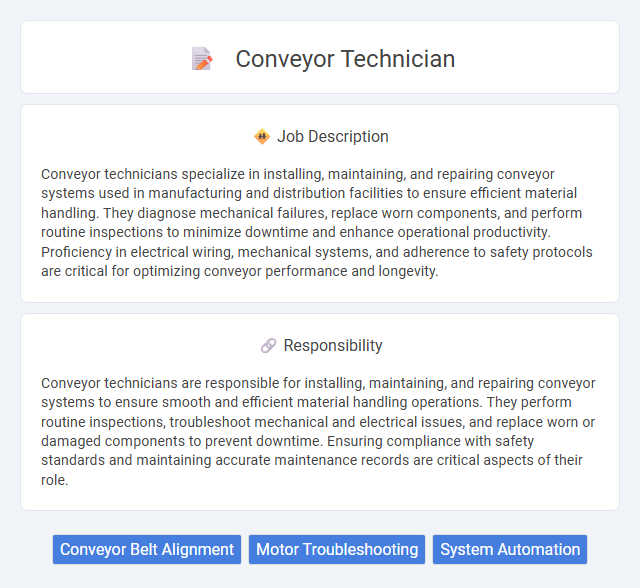
Conveyor technicians specialize in installing, maintaining, and repairing conveyor systems used in manufacturing and distribution facilities to ensure efficient material handling. They diagnose mechanical failures, replace worn components, and perform routine inspections to minimize downtime and enhance operational productivity. Proficiency in electrical wiring, mechanical systems, and adherence to safety protocols are critical for optimizing conveyor performance and longevity.
Individuals with strong problem-solving skills and good mechanical aptitude are likely to be well-suited for a conveyor technician role. People who handle physical work well and can manage repetitive tasks safely might find this job aligns with their abilities. Candidates with patience and the ability to troubleshoot under pressure probably have a higher chance of success and job satisfaction in this position.
Qualification
Conveyor technicians require a strong background in mechanical and electrical systems, typically demonstrated through technical certifications or an associate degree in industrial maintenance or a related field. Proficiency in diagnosing, repairing, and maintaining conveyor systems, including belt alignment and motor troubleshooting, is essential. Experience with programmable logic controllers (PLCs) and safety protocols enhances job performance and ensures operational efficiency.
Responsibility
Conveyor technicians are responsible for installing, maintaining, and repairing conveyor systems to ensure smooth and efficient material handling operations. They perform routine inspections, troubleshoot mechanical and electrical issues, and replace worn or damaged components to prevent downtime. Ensuring compliance with safety standards and maintaining accurate maintenance records are critical aspects of their role.
Benefit
A conveyor technician job likely offers benefits such as competitive wages, opportunities for overtime pay, and access to health insurance plans. Employees may also receive training programs that enhance their technical skills and promote career advancement. Job stability and a structured work environment could further contribute to overall job satisfaction and financial security.
Challenge
Working as a conveyor technician likely involves frequent troubleshooting and resolving complex mechanical and electrical issues under time constraints. The role probably demands staying updated on evolving conveyor technologies and safety standards to manage unexpected breakdowns efficiently. Challenges might also include diagnosing problems in diverse industrial environments, requiring adaptability and precision.
Career Advancement
Conveyor technicians specialize in installing, maintaining, and repairing conveyor systems essential for manufacturing and distribution efficiency. Career advancement opportunities include roles such as lead technician, maintenance supervisor, or conveyor systems engineer, requiring additional certifications and expertise in automation technologies. Proficiency in programmable logic controllers (PLCs) and mechanical systems enhances prospects for higher salaries and managerial positions within industrial operations.
Key Terms
Conveyor Belt Alignment
Conveyor technicians specializing in conveyor belt alignment ensure optimal performance by precisely adjusting belt tension and tracking to prevent misalignment and reduce wear. They utilize laser alignment tools and digital sensors to monitor belt position, minimizing downtime and improving system efficiency. Expertise in troubleshooting mechanical components and implementing corrective measures extends conveyor lifespan and supports consistent material flow in industrial settings.
Motor Troubleshooting
Conveyor technicians specializing in motor troubleshooting diagnose and repair electric motor issues to maintain efficient conveyor system operations. They utilize tools like multimeters and oscilloscopes to identify electrical faults, such as winding failures, rotor defects, and controller malfunctions. Expertise in motor types--including AC induction, DC, and servo motors--is essential for accurate troubleshooting and minimizing conveyor downtime.
System Automation
Conveyor technicians specializing in system automation troubleshoot, maintain, and optimize automated conveyor systems to ensure efficient material handling and reduce downtime. They utilize programmable logic controllers (PLCs), sensors, and motor drives to integrate conveyor components within smart manufacturing environments. Proficiency in diagnosing automation software issues and implementing real-time control solutions is critical for maximizing conveyor system performance.
 kuljobs.com
kuljobs.com